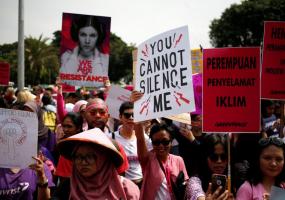State Censorship in Britain, Japan and America
09 May 2008
Kayo Tomono writes:
Dr Henry Laurence is a Research Associate at the RISJ and an Associate Professor of Government and Asian Studies at Bowdoin College in Maine, USA. He is currently a Senior Associate Member at the Nissan Institute of Japanese Studies at St Antony's College, Oxford. His lecture on 23rd April was based on his latest research into the comparision of public broadcasting in Britain, Japan and the US. Dr Laurence began with three principles which have importance in public broadcasting. These are: freedom of speech and freedom from government interference the obligation of broadcasters, especialy public broadcasters, to respect the audience and prevailing values and; the question of who pays for public broadcasters. Public broadcasters are required to be impartial/neutral, but 'it is very difficult in practice', he said. Then he introduced three cases which showed clear state intervention in a public broadcaster's programme in each democratic country. All evidence was, according to him, based on publicly available documents. He began with The War Game, a film made by the by BBC in 1965, which was about what would happen if a nuclear bomb dropped in Britain. It would stimulate the debate of the moral and practical consequences of the nuclear deterrance policy. The chairman of the BBC said that 'The showing of the film on television might well have a significant effect on public attitudes towards the detterrent. In these circumstances, I doubt whether the BBC ought alone to take the responsibility of deciding whether this film should be shown on television'. The issue went to The Government and the decision not-to-show was made. The BBC made a public comment that it was the BBC who had decided to cancel the film. It was finally shown in 1985. The case of 'Questioning Wartime Sexual Violence' by NHK, the Japanese public broadcaster, takes us to 2001. The film was about a people's tribunal on the sexual slavery of Asian women by the Japanese army during the Second World War. The tribunal considerd legal aspects such as crimes against humanity. The judge found the army guilty, and the original film contained this part. But it disappeared when it was on air. During this period, a cabinet member met NHK staff. Later, in 2005, the politician said that he had told NHK thet he wanted them to report on the matter from a fair and neutral viewpoint. The head of NHK, also later, denied there was a political interference. This case came to light because a number of interviees took NHK to the broadcasting regulatory authority, saying that their comments were edited so much that they were misrepresented. A couple of years later, the broadcasting regulatory authority found in their favour. 'Sugartime' was an American programme which was illustrated the diversity of family life in America. In the film a rabbit visited Orthodox Jews, evangelical Christian, Mormons, Mexican-Americans and cowboys. Once, the rabbit visited a gay couple. This was in 2005 when the Bush administration was in power. The Secretary of Education, having heard about the episode, sent a letter to the president of PBS, arguing that 'Many parents would not want their children to be exposed to the life-styles portrayed in the episode. Congress and the Department's purpose in funding this programming certainly was not to introduce this kind of subject matter to children.' The PBS canceled the episode, simply saying that this was only an internal matter, just as The NHK and The BBC had done. His point was, firstly, that state censorship uses, as a tool, 'impartiality', which is non-objectionable. The examples are given by Japan and US in that both countries claimed that this intervention was justified because public broadcasters have higher duties to be impartial. 'That is the rational they use to silence the staff', he said. His opinion was, however, this rationale did not work as a defence because the governments were highly selective in exercising their power to intervene. Secondly, government intervention in each case was only successful because it was pressing against open doors of very compliant broadcasters. He found that this seemed to be very important, saying 'this underlines the fact that national culture and national attitudes towards freedom of speech/'



